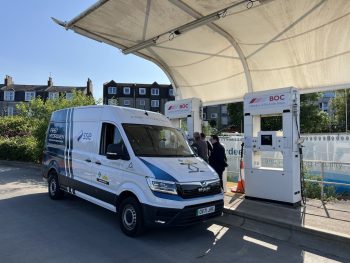Energy firm SSE has started trials of First Hydrogen’s fuel cell electric vehicle (FCEV), testing the green hydrogen-powered van in real-life settings.

The van is being operated from one of SSE’s sites in Aberdeen, which is located next to a hydrogen fuel station. The project will enable SSE to evaluate the benefits of hydrogen mobility alongside its growing fleet of EV engineering and maintenance vehicles as an alternative to fossil fuels.
The vehicle has already been driven by four SSE drivers, who have undergone two days’ training and are now using it to carry essential equipment and tools for their day-to-day jobs.
Feedback from the drivers shows the benefits of the technology including for ‘uptime’; FCEVs can be refuelled in around five to seven minutes, while battery electric vehicles (BEVs) typically take hours to recharge.
First Hydrogen’s hydrogen-powered van can also travel further on a single tank of fuel than equivalent BEVs on a single charge and can carry heavier loads without compromising on range – both common obstacles for van fleets looking to shift to BEVs.
Will Hannaford, driver for SSE, said: “First Hydrogen’s van is very pleasing to drive and is much smoother than my diesel vehicles. The zero-emission van will obviously improve the environmental impact of our day-to-day operations, but it has the additional benefit of performing well in city driving and recharging its battery during use, which gives it an impressive range.”
SSE driver Angus Burrows added: “Having learnt about operating a hydrogen-powered vehicle in the pre-trial training, I was excited to use the First Hydrogen’s van. It was also exciting to see how much work had gone into developing the vehicle and my enthusiasm has continued throughout the trial – I still find myself speaking about the vehicle in my day-to-day conversations!”
SSE currently operates one of the largest fleets in the UK and has already pledged to switch 2,500 of its vehicles to electric and install charging points for its 11,000 employees to use.
First Hydrogen’s hydrogen-powered vehicle is being closely monitored throughout the trial via onboard instruments. This helps its engineers to understand fuel consumption, mileage and vehicle performance in different conditions. It also enables them to keep track of the vehicle’s use, location and status in real time to keep the drivers and vehicle safe.
Ronnie Fleming, chief procurement officer at SSE, added: “In line with our commitment to net zero and EV100 pledge to electrify our fleet, we’re keen to explore all alternative fuel options. It’s been really interesting to see the vehicle in action, for our drivers to experience how it operates in practice and for our fleet managers to evaluate how hydrogen vehicles could fit into our future fleets should the infrastructure further develop.”
SSE joins other fleet operators such as Rivus in trialling the First Hydrogen van and is the first utility to take part in the project. The trials have been co-ordinated through the Aggregated Hydrogen Freight Consortium (AHFC), which works with large UK fleet operators to accelerate the adoption of hydrogen transport through vehicle deployment and refuelling infrastructure development
Steve Gill, CEO for First Hydrogen Automotive, said: “We see the future of zero-emissions transport as a mix of technologies to suit different vehicle types and usage, with fleets comprising hydrogen fuel cell and battery electric vehicles. We are thrilled to be operating in Aberdeen, which is already championing hydrogen use and is establishing good infrastructure.
“Trialling the van in the North East of Scotland will help us to demonstrate how hydrogen vehicles can carry larger payloads and to compare operational performance in scenarios where BEVs are currently used. Data collected during the trial will help us to optimise the vehicle, demonstrate its capabilities for future customers and inform further development.”

